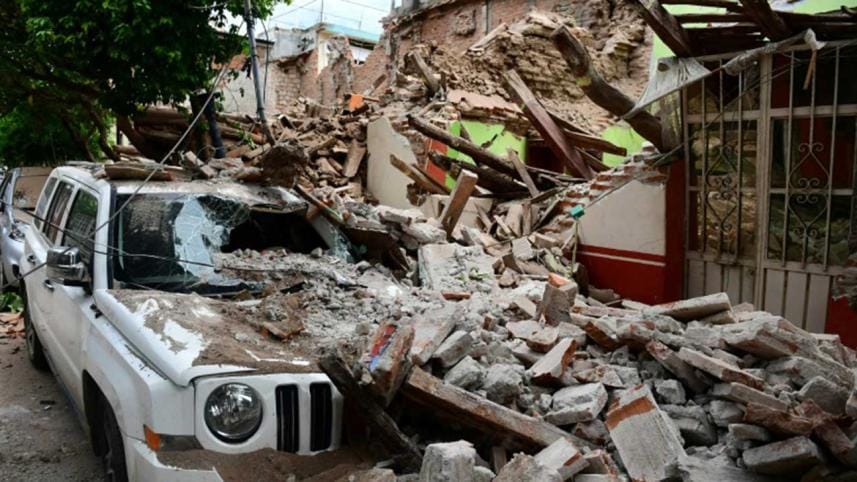Mexico mega quake death toll rises to 61

Police, soldiers and emergency workers raced Friday to rescue survivors from the ruins of Mexico's most powerful earthquake in a century, which killed at least 61 people.
In the southern region hit hardest by the quake, emergency workers looked for survivors -- or bodies -- in the rubble of houses, churches and schools that were torn apart in the 8.1-magnitude quake.
President Enrique Pena Nieto said 45 people were killed in Oaxaca, 12 in Chiapas and four in Tabasco. But the actual death toll could be over 80, according to figures reported by state officials.
Meanwhile Hurricane Katia made landfall in the country's east, packing rains likely to cause "life-threatening flash floods and mudslides, especially in areas of mountainous terrain" the US National Hurricane Center said.
The Category One storm, with sustained winds of 120 kilometers (75 miles) per hour, was closing in on the state of Veracruz which borders the Gulf of Mexico.
Adding to the concerns, authorities warned another massive quake could follow within 24 hours of the first hit.
Pena Nieto was speaking from the hardest-hit city, Juchitan in Oaxaca, where at least 36 bodies were pulled from the ruins.
The city's eerily quiet streets were a maze of rubble, with roofs, cables, insulation and concrete chunks scattered everywhere.
A crowd had formed at Juchitan's partially collapsed town hall, a Spanish colonial building where two policemen were trapped in the rubble.
Rescuers managed to extract one and were still working to save the other 18 hours after the quake.
"God, let him come out alive!" said a woman watching as four cranes and a fleet of trucks removed what remained of the building's crumbled wing.
His blue uniform covered in dust, Vidal Vera, 29, was one of around 300 police officers digging through the rubble. He hadn't slept in more than 36 hours.
"I can't remember an earthquake this terrible," he told AFP.
"The whole city is a disaster zone right now. Lots of damage. Lots of deaths. I don't know how you can make sense of it. It's hard. My sister-in-law's husband died. His house fell on top of him."
Record quake
A hotel mostly collapsed and many homes were badly damaged in the predominantly indigenous town of 100,000 people, which is tucked into the lush green southern mountains near the coast.
The governor said tens of thousands of ration packs, blankets and cleaning kits were arriving, along with 100 federal police reinforcements with rescue dogs to search for people in the wreckage.
"The priority in Juchitan is to restore water and food supplies and provide medical attention to those affected," Pena Nieto tweeted after touring the devastated town.
The president described the quake as "the largest registered in our country in at least the past 100 years" -- stronger even than a devastating 1985 earthquake that killed more than 10,000 people in Mexico City.
In Tabasco, two children were among the dead. One was crushed by a collapsing wall. Another, an infant on a respirator, died after the quake triggered a power outage.
Pope Francis, at an open air mass on a visit to Colombia, said he was praying "for those who have lost their lives and their families" in the disaster.
More than 200 people were injured across Mexico, officials said.
Four people were also injured in neighboring Guatemala, where President Jimmy Morales flew over affected areas and ordered urgent humanitarian assistance.
Hurricane coming
The epicenter of the quake, which hit late Thursday, was in the Pacific Ocean, about 100 kilometers off the town of Tonala in Chiapas.
Mexico's seismology service estimated it at 8.2 magnitude while the US Geological Survey put it at 8.1 -- the same as in 1985, the quake-prone country's most destructive ever.
The quake was felt as far north as Mexico City -- some 800 kilometers from the epicenter -- where people fled their homes, many in their pajamas, after hearing sirens go off.
Officials initially issued a tsunami alert, but later lifted it. However, the quake triggered waves that reached as far as New Zealand, more than 11,000 kilometers away.
Authorities said waves of up to 40 centimetres were recorded on the far-flung Chatham Islands, with 25 centimetre surges on the New Zealand coast, some 15 hours after the quake.
The quake struck as Mexicans were also bracing for Hurricane Katia, which strengthened to a Category Two storm as it rumbled toward the coastal state of Veracruz.
It is one of three active hurricanes currently in the Atlantic Ocean alongside Irma and Jose.
Mexico sits atop five tectonic plates, making it prone to earthquakes, and has two long coastlines that are frequently battered by hurricanes.
 For all latest news, follow The Daily Star's Google News channel.
For all latest news, follow The Daily Star's Google News channel.
Comments